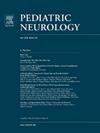Dramatic Response to Neurostimulation in Children With Medically Intractable Epilepsy Related to Pseudoisodicentric Chromosome 15q Duplication: A Case Series
IF 2.1
3区 医学
Q2 CLINICAL NEUROLOGY
引用次数: 0
Abstract
Background
15q11-q13 duplications (dup15q syndrome) in children with neurodevelopmental disorder may present with variable epilepsy phenotypes. The more common pseudoisodicentric or isodicentric chromosome 15 duplication often presents with medically refractory epilepsy. This case series illustrates 3 cases with dramatic response to neurostimulation in dup15q syndrome with medically refractory epilepsy.
Methods
We present 3 clinical cases analyzed by querying the medical record. Demography, medical history, and treatment efficacy were systematically reported and analyzed.
Results
All 3 cases showed dramatic response to neurostimulation where medication management failed. Treatment responses ranged from greater than 90% reduction in seizure frequency to seizure freedom. Moreover, all patients showed clinically significant developmental gains.
Conclusions
Neurostimulation produced dramatic seizure reduction in our cohort of dup15q syndrome. Early neurostimulation should be considered in medically refractory epilepsy in dup15q syndrome. Further clinical trials investigating the efficacy of neurostimulation will be helpful in this rare neurodevelopmental condition.
与假等心染色体15q重复有关的难治性癫痫患儿对神经刺激的显著反应:一个病例系列
背景:神经发育障碍儿童的15q11-q13重复(dup15q综合征)可能表现为不同的癫痫表型。更常见的15号染色体假等心或等心重复常出现医学上难治性癫痫。本病例系列说明了3例dup15q综合征伴医学难治性癫痫患者对神经刺激的显著反应。方法通过查阅病案对3例临床病例进行分析。系统报告和分析人口统计、病史和治疗效果。结果3例患者在药物治疗失败后均表现出明显的神经刺激反应。治疗反应范围从癫痫发作频率降低90%以上到癫痫发作自由。此外,所有患者均表现出临床显著的发育获益。结论:在我们的dup15q综合征队列中,神经刺激可显著减少癫痫发作。dup15q综合征难治性癫痫应考虑早期神经刺激。进一步的临床试验研究神经刺激的疗效将有助于治疗这种罕见的神经发育疾病。
本文章由计算机程序翻译,如有差异,请以英文原文为准。
求助全文
约1分钟内获得全文
求助全文
来源期刊

Pediatric neurology
医学-临床神经学
CiteScore
4.80
自引率
2.60%
发文量
176
审稿时长
78 days
期刊介绍:
Pediatric Neurology publishes timely peer-reviewed clinical and research articles covering all aspects of the developing nervous system.
Pediatric Neurology features up-to-the-minute publication of the latest advances in the diagnosis, management, and treatment of pediatric neurologic disorders. The journal''s editor, E. Steve Roach, in conjunction with the team of Associate Editors, heads an internationally recognized editorial board, ensuring the most authoritative and extensive coverage of the field. Among the topics covered are: epilepsy, mitochondrial diseases, congenital malformations, chromosomopathies, peripheral neuropathies, perinatal and childhood stroke, cerebral palsy, as well as other diseases affecting the developing nervous system.
 求助内容:
求助内容: 应助结果提醒方式:
应助结果提醒方式:


